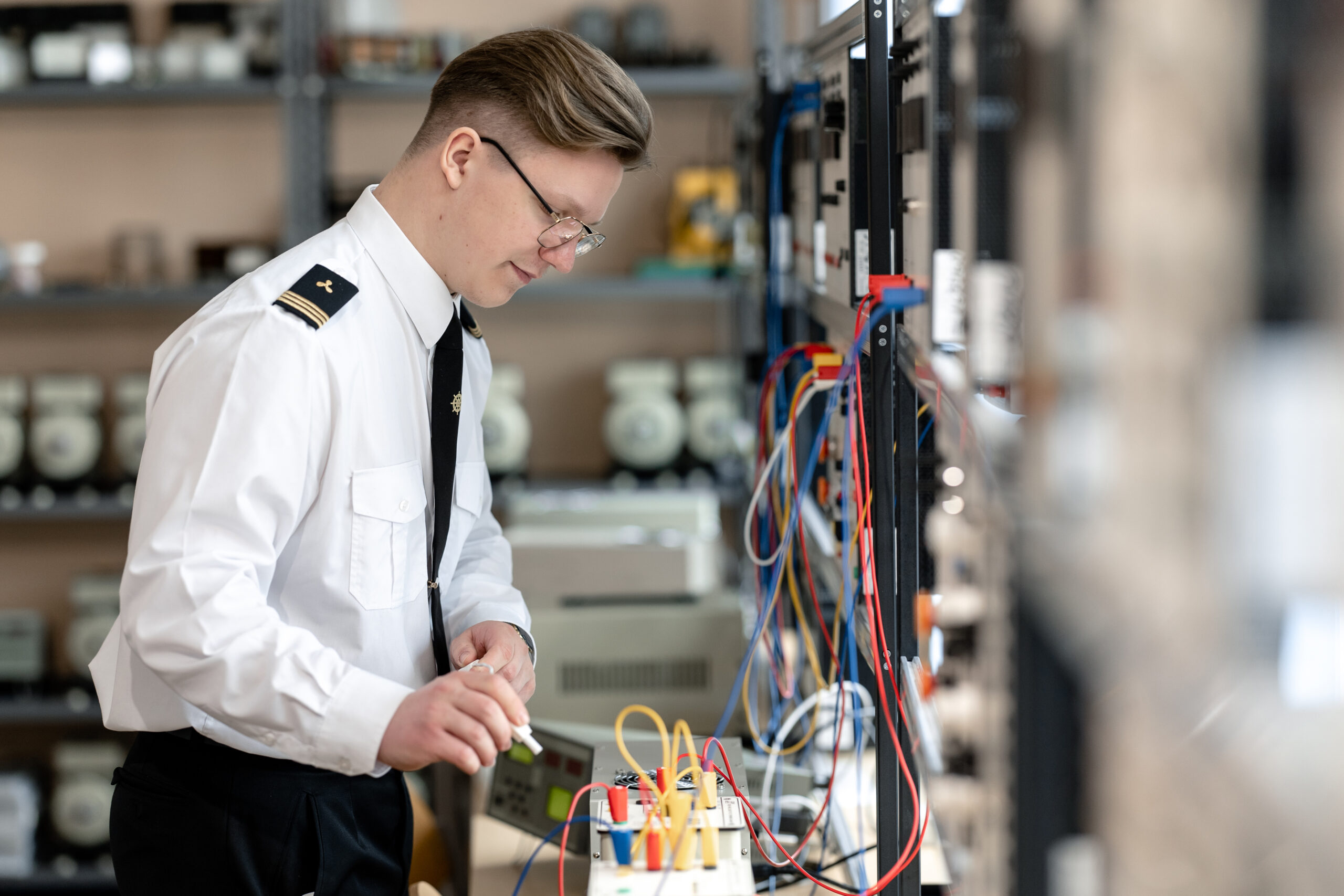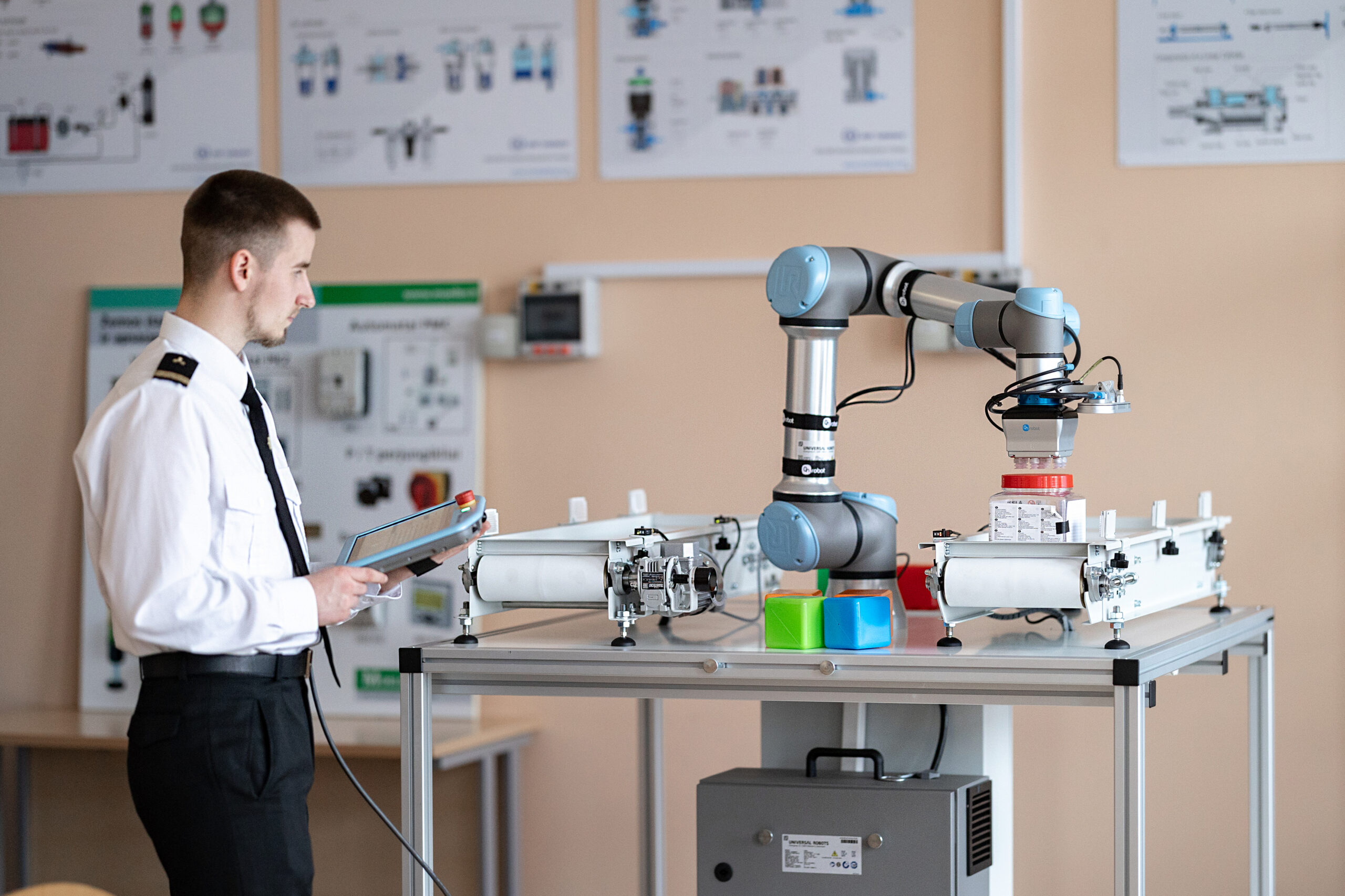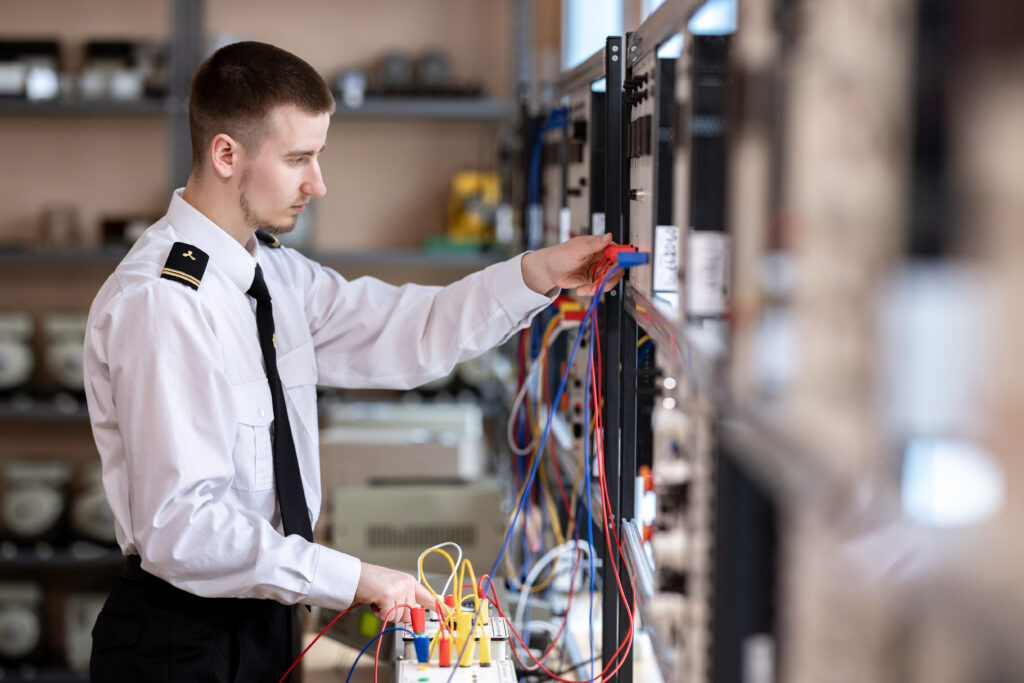
FOR QUESTIONS REGARDING STUDY PROGRAMMES, PLEASE CONTACT:
Room 219
Phone: +370 46 397 246
Mobile Phone.: +370 650 25 985
Department of Marine Engineering dr. Valdas Lukauskas
E-mail: valdas.lukauskas@vilniustech.lt
Room 219
Phone: +370 46 397 246
Mobile Phone: +370 650 25 985
Administrator Jūratė Zajauskienė
E-mail: jurate.zajauskiene@vilniustech.lt
a
A great opportunity to become a highly sought specialist who safely operates ships’ electromechanical, electronic and control equipment of unlimited power; supervises the electromechanical service of ships, conducts investigation into the service’s activities; analyses the results of activities; evaluates them from an engineering and economic point of view; plans, manages, and controls activities; independently eliminates failures of the ship’s electrical and electronic equipment.
More information in the AIKOS
(Full-time studies)
(Part-time studies)
Duration of internship
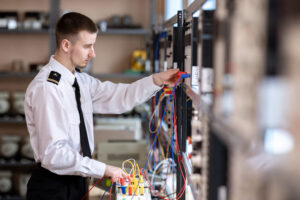
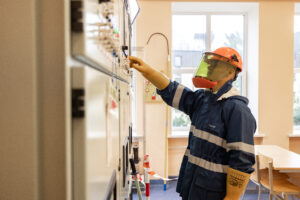
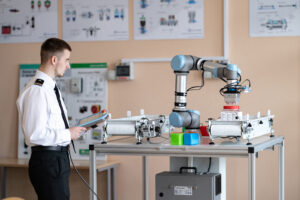
The lecturers are ship electromechanics, sea engineers, researchers and scientists from the field of mechanical engineering, professional seafarers who base their knowledge on personal experience of working at sea.
Career
Upon graduation at the level of Engineering activities, the student will be able to properly operate, maintain, and repair ship electrical, electronic, and control equipment, automation, power distribution and electrical systems, main and auxiliary mechanisms, which are important for the ship’s maneuverability and safety, applying project management principles and following the rules and procedures for safe work on board, and safe operation of electrical and energy equipment. Carry out and organize the activities of the electromechanical part of the ship, and ensure the requirements of international conventions, national general and maritime legislation and occupational safety.
Specialized computer programs and electronic simulators that simulate real information systems operating in Klaipėda and other seaports are intensively used during training internships and subject studies, so students do not have any difficulties in practice or commencing their work.
GOAL OF THE STUDY PROGRAMME
Prepare a highly qualified electromechanical engineer regulated by the conventions of the International Maritime Organization, a leading specialist in maritime electrotechnical engineering, capable of:
– Understanding and applying the general principles and laws of engineering, electrical engineering, natural and environmental sciences, ensuring the operation and maintenance of electricity, electronics, power plants, control and distribution devices, propulsion and auxiliary mechanisms;
– Reading, drawing and analyzing electrical diagrams independently while using information technologies, conduct service activity investigation, analyze technical performance results, and make effective engineering decisions in order to achieve economically useful results;
– Supervising the electromechanical service of ships, plan, manage, and control activities;
– Applying modern information and communication technologies;
– Operating, maintaining and troubleshooting ship’s electromechanical equipment safely, taking into account the influence of various factors on system reliability and availability, technical maintenance procedures, while properly selecting work and measurement tools and devices, adhering to the national and international general and maritime legislation, conventions, power quality standards, safe shipping and other requirements.
INTERNSHIP
Duration of professional internship is 12 months. Of which: 4-month shore internship and 8-month seafaring internship. A seaman’s degree is awarded and a seaman’s degree diploma is issued upon fulfillment of all internship requirements.
SHORE INTERNSHIP
– Training internship of locksmithing and repairs in the LMA workshop (1st year);
– The internship of technical maintenance and repairs of ships’ electrical equipment is done in shipbuilding and repair companies (during 2nd year).
SEAFARING INTERNSHIP
Seafaring internship is carried out in international crews on various ships of the world and in various sailing regions.
– 4-month professional seafaring internship (after the 2nd year);
– 4-month graduation seafaring internship (after the 3rd year)
The minimum duration of seafaring internship at sea is 6 months.
The remaining 2 months of seafaring internship can be completed ashore.
The minimum duration of seafaring internship for qualification acquisition is 4 months.
However, graduates who want to work on ships are required to complete 6-month seafaring internship. During their studies, students have the opportunity to complete a 6-month seafaring practice, so that after graduation, they will not only acquire the professional qualification of a ship’s electrical engineering mechanic, but also be able to start working on a ship as an electrical engineering mechanic-engineer.
If a student has completed only 4 months of seafaring practice during their studies, but wishes to start working as an electrical engineering mechanic, they are given the opportunity to go on a 2 – month internship within 1 year of graduation. The trainees of the Junior Officer Command Training (JOCT) perform a 2-month internship on the military ships of the Lithuanian Armed Forces. This internship is a part of seafaring internship and counts towards the total duration of the seafaring internship.
WHY CHOOSE THIS STUDY PROGRAMME?
This is the only such undergraduate study programme in the field of maritime technology in the country that meets the standards of the International Maritime Organization IMO International Convention on Standards of Training, Certification and Watchkeeping for Seafarers STCW of 1978 and maritime degree certificate standards. The professional bachelor’s degree in maritime engineering and the qualification of ship electrical engineering mechanic are awarded upon completion.
An important part of the studies is the professional activity internship, completed in repair ships and ships of various types.
A large network of academic exchange partners, including European universities, can be chosen for part-time studies, and internship can be completed on ships of domestic and international shipping companies sailing in various regions.
ENVIRONMENT OF STUDIES
Studies take place in a modern environment that meets international requirements. There are traditional engaging lectures, seminars, discussions, analysis of scientific and professional literature, and students have access to a modern library filled with the latest scientific and informational publications, along with an internal digital teaching/learning environment and digital resources of the academy.
During lectures, exercises, and seminars, analysis of modern ship management scenarios and cases is carried out, technological solutions to ship management problems are sought, and computer simulation of the ship’s voyage is performed. Computerized training is extremely relevant during the studies, so training of practical skills takes place in electronic navigation simulators, simulating real scenarios of ship control.
Training and exercises of leadership and psychological resilience, individual and team projects, laboratory work on ship viability and saving people’s lives, firefighting, medicine, radio communication, electronic nautical charts, engineering and technology, etc., conducted in laboratories, individual work, professional internship on ships sailing in the oceans of the world, etc. are extremely important elements of the programme.
Students of LMA maritime studies are required to wear uniforms.
LMA is equipped with sports halls and gyms, which are intended for optional sports, physical education classes, sports competitions, sports and other events in which students of all study programmes participate. They can also spend their free time in these facilities.
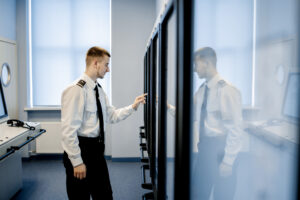
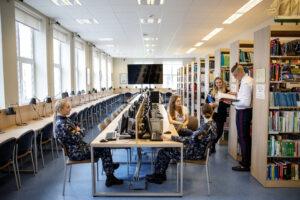
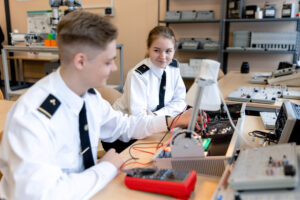
SUBJECTS OF STUDY PROGRAMME
| 1st SEMESTER | CREDITS (ECTS) |
|---|---|
| Applied Mathematics | 4 |
| Applied Mathematics | 4 |
| Information Technology | 4 |
| Mechanical engineering systems | 8 |
| Materials Engineering | 3 |
| Thermodynamics | 3 |
| Hydraulics | 2 |
| Training internship of locksmithing and repairs | 6 |
| 2nd SEMESTER | CREDITS (ECTS) |
|---|---|
| Training internship of locksmithing and repairs | 6 |
| Applied Chemistry | 3 |
| Electrical Engineering and Electrical Measurements | 6 |
| Mathematical Basics of Engineering | 3 |
| Engineering and Computer Graphics | 4 |
| Maritime English | 3 |
| Philosophy and ethics/ Sociology/ Basics of Political Science/ European Culture/ Psychology of Management/ Intercultural Communication/ Development of Seaports and Navigation | 2 |
| Personal Survival Techniques, Fire Safety and Fire Fighting, Basic First Aid, Personal Safety, and Social Responsibility (STCW, A-VI/1), Ensuring of the Safety of the Ship (STCW A-VI/6-2) | 3 |
| 3rd SEMESTER | CREDITS (ECTS) |
|---|---|
| Basics of Power Electronics | 3 |
| Engineering Systems of Ships’ Auxiliary Mechanisms | 4 |
| Electrical and Power Transmission Equipment of Ships | 3 |
| Occupational, civil, and environmental safety | 5 |
| Terminology of Marine Electrical Engineering and Electrical Systems and Language Practice | 3 |
| Internship of Technical Maintenance and Repairs of Ships’ Electrical Equipment | 12 |
| 4th SEMESTER | CREDITS (ECTS) |
|---|---|
| Electronics and Automatics of Ships | 5 |
| Electrical Technology of Ships | 6 |
| Automatic Systems of Ship Power Plants | 3 |
| Professional seafaring internship / Professional coastal boating internship / 12-month professional seafaring internship on military ships / Professional internship of technical service of ships’ electrical equipment | 12 |
| Maritime English (Terminology of navigation bridge and ship’s radio communication systems and electrical materials and technology, and language practice) | 4 |
| 5th SEMESTER | CREDITS (ECTS) |
|---|---|
| Occupational Language Culture and Academic Literacy | 3 |
| Engineering Research Methodology | 3 |
| Management of Maritime Engineering Projects | 2 |
| Special Fire Fighting (STCW A-VI/3) and First Aid (STCW A-VI/4) | 3 |
| Renewable Energy Sources | 3 |
| Professional seafaring internship / Professional seafaring internship on military ships / Professional coastal boating internship | 12 |
| Marine English (Terminology of automation, control systems, and technical maintenance, and language practice) | 5 |
| 6th SEMESTER | CREDITS (ECTS) |
|---|---|
| Ship Navigation Equipment and Communication Systems | 2 |
| Ship Computer Networks | 4 |
| Graduation professional seafaring internship / Graduation professional coastal boating internship / Graduation professional seafaring internship on military ships / Graduation professional internship of technical service of ships’ electrical equipment | 24 |
| 7th SEMESTER | CREDITS (ECTS) |
|---|---|
| Operation of Ships’ Electrical Equipment | 5 |
| Maritime Law | 3 |
| High Voltage Systems and Equipment of Ships | 3 |
| Work with lifeboats, rafts and rescue boats (other than high-speed lifeboats) (STCW A-VI/2-1) | 2 |
| Electronic Simulator of Ships’ Energy Equipment and Management of Ship’s Engine Room Resource (STCW A-III/1-3, A-III/6, A-VIII/2) | 4 |
| Final qualification exam | 2 |
| Thesis of the Professional Bachelor | 10 |
ADVANTAGES OF STUDIES IN LITHUANIAN MARITIME ACADEMY:
• Student leisure area
• Higher education high quality studies in Europe
• Worldwide benchmarked marine and onshore study programmes
• Prestige and quality
• Study mobility in more than 60 higher education institutions and Partners in Europe in frame of Erasmus+ programme
• Training using modern simulators
• Studies and practice in strong cooperation with maritime industry
• The uniqueness of studies is links with global maritime industry – guest Lecturers are invited from various port companies, field trips are organised
• Research and practice are provided



